- A gap remains between organizations’ stated culture (espoused values) and employees’ lived experience. This gap varies by employee level, with leaders of leaders having more positive perceptions of their organization’s culture than nonmanagers.
- HR departments know that shaping and sustaining culture is important for achieving desired organizational outcomes, but few believe that HR is very effective in doing so.
Need Extra Help?
Speak With An Analyst.
- Get on-demand project support
- Get advice, coaching, and insight at key project milestones
- Go through a Guided Implementation to help you get through your project

Our Advice
Critical Insight
Shaping an organizational culture where everyone thrives hinges on leadership role modeling, implementation of strategically aligned culture initiatives, and HR alignment, all of which reinforce the desired values and behaviors. Culture sustainment enhances competitive advantage and supports the achievement of desired organizational outcomes.
Impact and Result
- Clarify key players’ roles and accountabilities in managing and reinforcing culture change.
- Bridge the gap between your current and desired culture, addressing pain points, preserving strengths, and building a competitive advantage.
- Align HR programs (e.g. performance management, recognition) and build leadership accountability to reinforce desired behaviors and maintain shifts in mindsets and beliefs.
- Implement change management tactics and sustainment components to embed the desired culture into the organization’s day-to-day operations.

Shape and Sustain Organizational Culture
This program has been approved for continuing professional development (CPD) hours under Section A of the Continuing Professional Development (CPD) Log of the Human Resource Professionals Association (HRPA).
McLean & Company is recognized by SHRM to offer Professional Development Credits (PDCs) for SHRM-CP® or SHRM-SCP® recertification activities.
HR Certification Institute's® (HRCI®) official seal confirms that McLean & Company meets the criteria for pre-approved recertification credit(s) for any of HRCI's eight credentials, including SPHR® and PHR®.
How to complete this course:
Use these videos, along with the project blueprint deck above, to gain an understanding of the subject. Start with the Introduction, then move through each of the course modules. At the end of each module, you will be required to complete a short test to demonstrate your understanding. You will complete this course when you have completed all the course tests.
- Number of Course Modules: 5
- Estimated Completion Time: 1.5 hours
Learning Outcome
This course will equip learners to design and implement organizational culture change initiatives that drive long-term success. Through practical tools and frameworks, learners will develop strategies to close the gap between stated values and lived experiences, inspire leaders to role model desired behaviors, align HR practices with core values, and embed the desired culture into everyday work for long-term impact.
Learning Objectives
By the end of this course, learners will be able to:
- Recognize the importance of organizational culture and the need to shape and sustain it to achieve desired outcomes.
- Design a plan for culture change by identifying what’s needed, analyzing organizational readiness, and outlining success metrics.
- Support leaders in driving culture initiatives by clarifying roles and co-developing action plans.
- Identify opportunities for HR to support culture change by creating plans to align HR areas with the desired culture.
- Implement strategies to sustain culture change by planning communication, supporting the launch of culture initiatives and measuring progress for continuous improvement.
All of our McLean Academy courses have closed captioning available. To turn this function on, click on the C.C. in the bottom right corner of the video screen and click "English" on the options that pop-up.
Course Modules
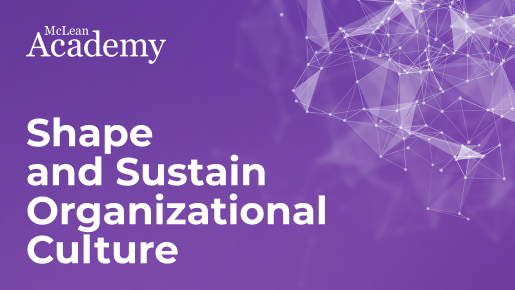
Introduction
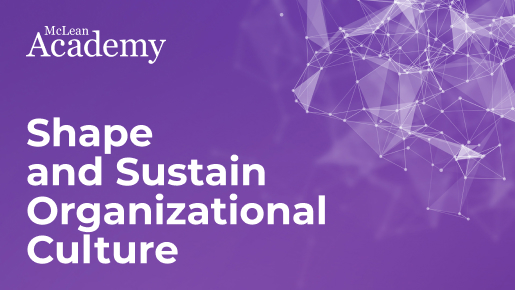
Module 1
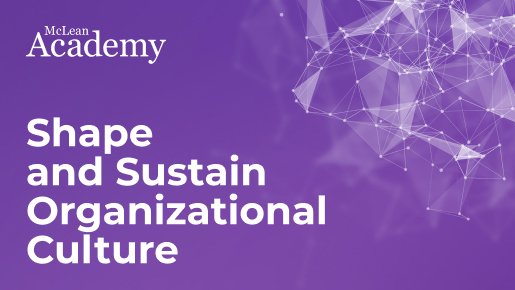
Module 2
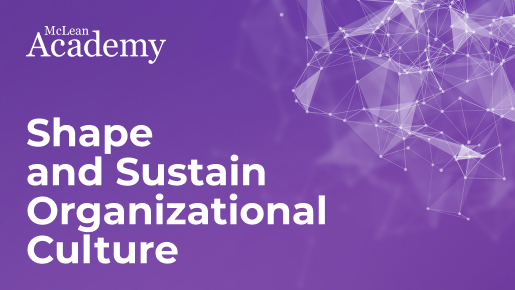
Module 3
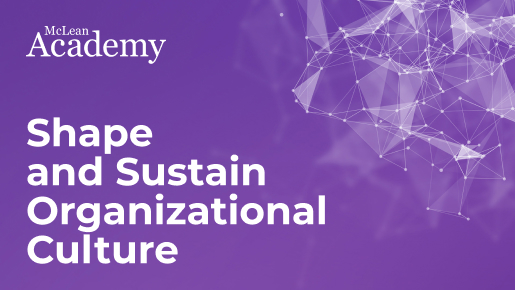
Module 4

 Articulate Organizational Culture
Articulate Organizational Culture
 Shape and Sustain Organizational Culture
Shape and Sustain Organizational Culture
 Implement and Sustain Cultural Integration Post-Merger or Acquisition
Implement and Sustain Cultural Integration Post-Merger or Acquisition
 Uncover the Employee Value Proposition
Uncover the Employee Value Proposition
 Plan to Extinguish Organizational Burnout
Plan to Extinguish Organizational Burnout
 Create a Holistic Employee Wellbeing Program
Create a Holistic Employee Wellbeing Program
 Unlocking Belonging in the Workplace
Unlocking Belonging in the Workplace
 Introduction to Psychological Safety for HR
Introduction to Psychological Safety for HR
 Introduction to Trauma-Informed Workplaces for HR
Introduction to Trauma-Informed Workplaces for HR
 The Rise of Organizational Transparency
The Rise of Organizational Transparency
 Enable Innovation Through Culture
Enable Innovation Through Culture
 Ingrain and Sustain Employee Recognition
Ingrain and Sustain Employee Recognition
 Design an Employee Volunteer Program
Design an Employee Volunteer Program
 Neuroscience and HR
Neuroscience and HR
 Flow State: A Gateway to Engagement, Performance, and Productivity
Flow State: A Gateway to Engagement, Performance, and Productivity
 Demystifying Emotions in the Workplace
Demystifying Emotions in the Workplace